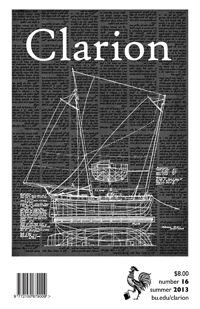|
Frances Gossen and Meghan Kelly Reviewed: Hector and Achilles at the Kresge Little Theater Echoes of screaming and clashing of shields set an eerie tone at the beginning of the world premiere of Hector and Achilles at MIT this August. Based on an episode from Homer’s Iliad and written in a surprisingly unstilted haiku verse, Edward Eaton’s script dials in on the fatal contest between the two great heroes of the siege at Troy. Eaton—who besides writing the play directed and choreographed the fights—seems to wish to identify the battle between the hero of the Trojans and the chief of the Myrmidons with the larger conflict between civilization and barbarism. Odysseus and Ajax are depicted as fools, self-centered and uninterested with matters of honor that motivate (and consume) Priam and Hector. The cowardly Greeks cooking up their plots against the Trojans were so silly at times as to seem like slapstick players a la the Three Stooges or Marx Brothers. As characterization this comedy gave the Greeks a villainous cast. And that seems to be Eaton’s aim: Troy is the great empire when the lights go up, the retainer of art and intellect and sympathy. “Who are these villains? / Base and vile they are. How can / They be beating us?” asks Priam of his enemies. That the Greeks do beat the Trojans, we know from the start, meaning that the drama of this kind of history play comes from allegory and character rather than plot. In making Troy the sympathetic side, the playwright seems to be asking that we identify our modern empires with Trojan greatness and Trojan defeat. Hector, defender, is of course surrounded by his loved ones instead of far from home. We think it a smart decision to write Astyanax (Katheryn Milligan) as nine years old rather than as an infant. Some of the sweetest sentiment of the play is shown during discussions between the father and son about what it means to be a hero. When his father says, “You used to cry when / I prepared for battle,” Astyanax replies: “That / Was when I was young.” It is a precocious statement, crushing in its deft portrayal of a generation raised in war. Hector, horrified despite his own standing as a hero of war rather than peace, tells his son that it is better to be a rabbit in a warren with family than a lonely, scavenging hawk. The image is Eaton’s, and quietly poetic. Other departures from the source material were smaller in scale but crucial to effect. Eaton makes Hector less certain that he will fall to Achilles’ sword. If he does die, Hector says, in order for Troy to continue on, “All that needs to survive is / The smallest ember.” This hopefulness struck a sentimental note not only not present in the original, but at odds with the political symbolism seemingly at work between the lines elsewhere in the play. The Hector of the Iliad minces no words when he tells his wife Andromache there will come a day when sacred Ilium will fall, and Priam and the sons of Priam will fall by an ashen spear. That tragic force is diminished rather than deepened by the superfluous (and thoroughly modern) hope Hector bears with him into battle. Briseis, Achilles’ spear-captured bride, was a fascinating part of this production, and an excellent contrast to the unwavering, loyal Andromache so idealized in the Iliad. Homer never gives her a voice, but Briseis as written by Eaton and played by Nicole Dalton is strident and progressive, jaded, tough, and witty. She recognizes that Trojans and Greeks alike see her as inferior due to her gender, but uses her allure to her advantage and the advantage of her city. Here, her capture by the Greeks is shown to be an intentional ploy meant to place her before Achilles as a distraction. Is her apparent affection for Achilles a cunning performance meant to win his confidence and keep his attention away from the fighting? Or would Eaton have us believe a prisoner might fall so quickly for her captor? It is right that we are ever unsure. Denied control over her own fate, Briseis walks a dangerous line with her loyalties divided between her cousin Hector and her lover Achilles. Eaton’s writing conveys this nuance well. Christopher Smith’s Achilles was brilliant. Silent except for roars of grief for most of the play, his eyes burn constantly with the famous menis or divine wrath. This is not the weeping, existential Achilles of the Iliad but an animal of passions starkly contrasting the intellectualism and human-heartedness of Hector (played with matching skill by Timothy Kopacz). Achilles’ final speech was especially striking. He is surrounded by ghosts, speaking wisdom that only a man who lives for the battle can comprehend. He is alone with his memories and bidding farewell to those he has sent down to the House of Death. The doomed hero speaks at last to the shade of departed Patroclus, and then stands alone on stage, staring out at a silent audience. His final words: “I will spend my last / Days on fire. Women will cry / In lamentation.” If the core of the Iliad is the wrath of Achilles, the last lingering note of Eaton’s play is Achilles’ grief, a grief that by the transitive property of drama speaks against nationalism and war of all ages, and mourns the losses on every side as equally lamentable. _ _ Frances Gossen, co-editor of Clarion, hails from Louisville, KY. Meghan Kelly is studying classics and English classical at Boston University. She is a Trojan War enthusiast and a budding Yeats scholar. |
ISSN 2150-6795 |








